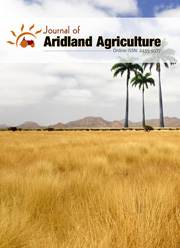Effect of treated wastewater irrigation on plant growth and biochemical features of two wheat cultivars under elevated level of CO2 and UV-B radiation
DOI:
https://doi.org/10.25081/jaa.2021.v7.6861Keywords:
Climate change; wastewater; Antioxidant; wheat crop; UV-BAbstract
Climate change is a serious problem affecting worldwide agricultural production and encourages researchers to investigate plant responses and grow crops under changed growing conditions. In arid and semiarid regions, treated wastewater is a common alternative source of water for irrigation. The proposed study examined the impact of irrigation with treated wastewater and the effects on the growth of wheat crops of environmental stress factors, including UV radiation and carbon dioxide. The experiment was conducted in a transparent Open Top Chambers facility and the treatments were administered in the hot UAE climate for ninety days. In order to understand the physiological mechanisms of plant adaptation under the conditions given, physiological and biochemical characteristics such as anti-oxidant enzymes have been assessed. The results revealed that the elevated CO2 level increased the growth parameters, whereas when compared to control, the UVB treatment affected plant growth. In the seedling process, established under regulated development, the differential response of antioxidant activity, superoxide dismutase (SOD), catalase (CAT), and peroxidase (POX) activities were observed among intrinsic biochemical activity in the selected Wheat varieties. Our findings show that wheat varieties are suitable as industrial crops for the production of antioxidants under irrigation with treated wastewater because the quantity and quality of their yield have not been affected. This practice will contribute to a clean environment and the stress on freshwater will be reduced by its reuse.




 .
.